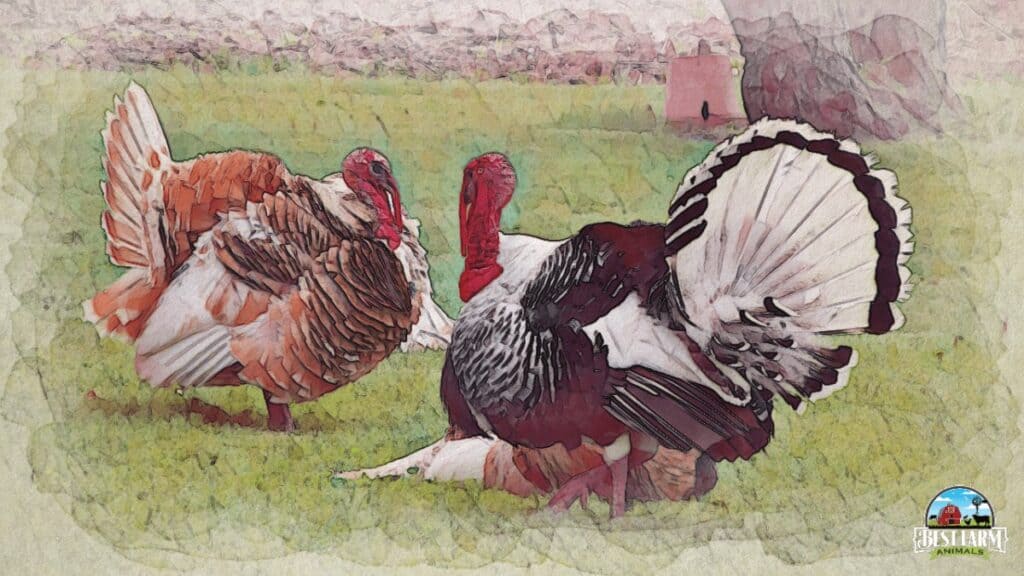So turkey mainly had been a meal I prepared at Thanksgiving, and I had never really had as much experience with them as I do with chickens. Imagine my surprise when I took in a tenant for the old cottage on my land and the new tenant asked if I would mind if he brought his pet turkeys with him.
Pet turkeys!?!
That’s right! Turkeys make excellent pets. Turkeys are loyal, friendly, curious, and very entertaining. With their unique dance, turkeys will amuse your family for hours, and turkeys also love being pet for hours. Before getting a turkey as a pet, keep in mind that they require lots of food, large spaces, big nests, loads of clean up…and did I mention they are really cute?
My First Turkey Encounter
So back to the turkeys on my land. That morning, I headed to my pickup to zip into town when I saw a huge hulking shape on my windshield. At first, I thought an ostrich had gone through the windshield, but then I realized it was a very large turkey. This tom turkey was sitting on the bonnet, admiring his own reflection in my windshield!
Turkeys have large and powerful claws, and their wings are pretty intimidating too. I tried shooing the turkey off my vehicle, but it simply looked at me with large soft eyes. That’s when I considered this pet turkey to be tame. So I tentatively tapped it on the wing, and the turkey just continued staring at me with huge but docile eyes.
What was I going to do?
Finally, not knowing what else I could do, and since the turkey’s claws were starting to rake furrows in my bonnet, I wrapped my arms around the turkey like I was holding a baby, and he happily nestled down against my chest. I was amazed!
Heading to the distant cottage with an overflowing armful of turkey, the bird hung his long neck over my shoulder and seemed very content with being carried like a baby. I returned the wayward pet bird to his rather embarrassed owner a few moments later. We discussed the need for an enclosure for the turkeys and I headed to town, still staring at the scratches on my old pickup.
15 Things You Need To Know Before Raising Turkeys as Pets
Over the next few weeks, I grew used to the large turkeys waddling around my yard whenever they escaped their enclosure. I also learned some exciting things about turkeys and just why they are such popular pets.
1. Turkeys Are Cute
If you consider turkeys as a pet, be prepared for their cuteness overload. Turkeys as pets are both a good and a bad thing. It means you will have a great time watching and interacting with the turkeys, but it will also be really difficult to get angry at them when they do something wrong.
When the tom turkey decides to scratch up your dining room table after sneaking over the backdoor, you won’t be able to reprimand (or cook) him, even though he probably deserves it. The turkey’s intelligence is also quite amazing, and turkey pets often enjoy playing games of hide and seek with treats. They enjoy music, recognize faces, and they can even remember a range of vocal commands once trained.
Do turkeys bond with humans? Turkeys are incredibly social animals, and they bond with their human owners very similarly to how a dog would bond with their masters. When a turkey bonds with a human, it’s a long-lasting relationship; they can be very affectionate and sensitive. You can expect happy greetings and purring when they see you.
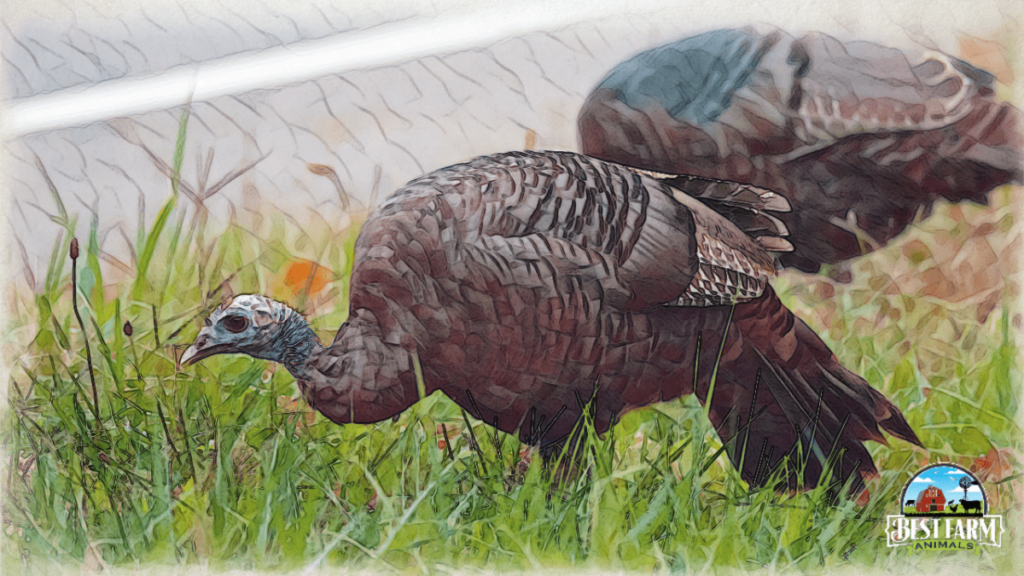
2. You Need a Lot of Space to Keep Turkeys
Turkeys are not like chickens, and they require a lot of space. Turkeys need larger areas to forage and run around, and even their nesting areas or boxes need to be larger. The larger the area, the happier your turkeys will be. Consider your available space before you opt for a turkey as a pet.
If you plan on keeping your turkey pet in your backyard, you should remember that their run should be 10 by 10 feet at least. Their nesting enclosure should be the same size, and this is all just for one turkey. You would need to increase this by 50% for every additional turkey.
Some cities and suburbs have laws against keeping turkeys as pets since they require so much space. Check your local bylaws to ensure you can keep a turkey as a pet if you live in the suburbs. There are no restrictions with a smallholding, provided you ensure your turkey stays on your property and doesn’t go visiting the neighbors.
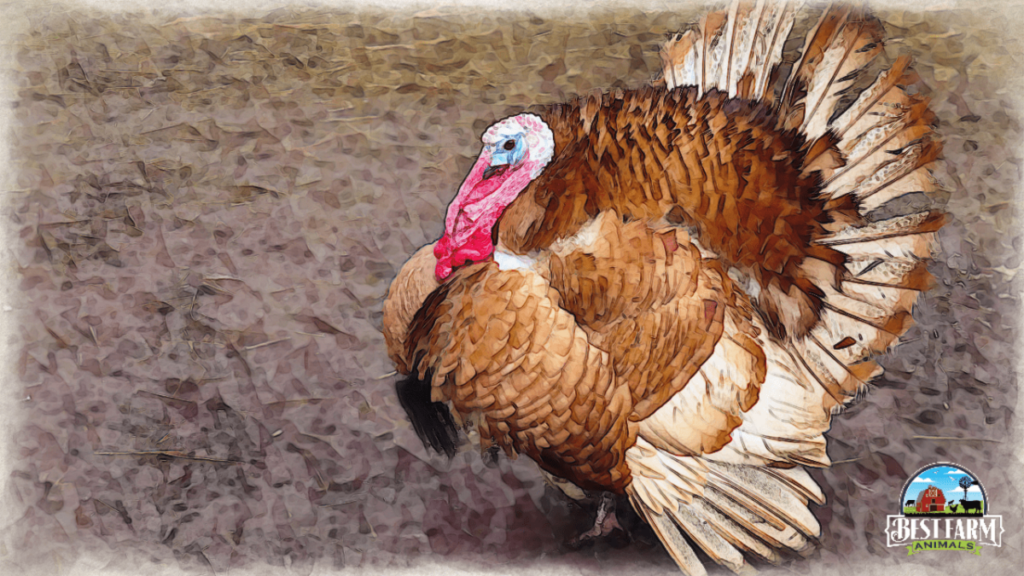
3. A Turkey Is a Large Bird
You may have gathered from point number two that turkeys are big, but as a non-turkey person, I was amazed by just how big they are. Male turkeys can reach a length of four feet, while female turkeys can grow up to three feet long.
Turkeys are heavy too. A domestic adult male turkey can weigh up to 86 pounds, while wild turkeys can weigh between 8-24 pounds and wild female turkeys weigh in at 7-16 pounds. Keep this in mind when you decide to have a turkey follow you around or train it to sit on your lap for cuddles. Eventually, that small turkey chick or poult will grow much larger and potentially be dangerous to hold.
4. Turkeys Eat a Lot
When you plan on getting a turkey as a pet, you should also know that the feed bill will be substantial. A turkey eats a lot more than a chicken does. Most turkey pellets are high protein, which means they have a bigger price tag too.
In addition to the cost of feeding one or two turkeys, you need to weigh up the responsibility of regularly feeding your turkeys. They need to be fed at least twice daily for adults and three times per day for poults.
Make sure you feed your turkeys a game bird feed (on Amazon) that’s formulated for their unique needs better than chicken feed is.
5. The Turkey Chicks Are “Special”
Poults are a lot different from regular chicks. They are attention-craving bundles of fluff, and they will follow you everywhere in the house. Poults are more demanding than cats.
The benefit of raising a poult from an egg is they will bond to you much more easily than if you buy an adult turkey. For children, this process of raising a poult to adulthood is a precious event, and the bond they can build with their own bird will last a long time since turkeys live longer than 10 years.
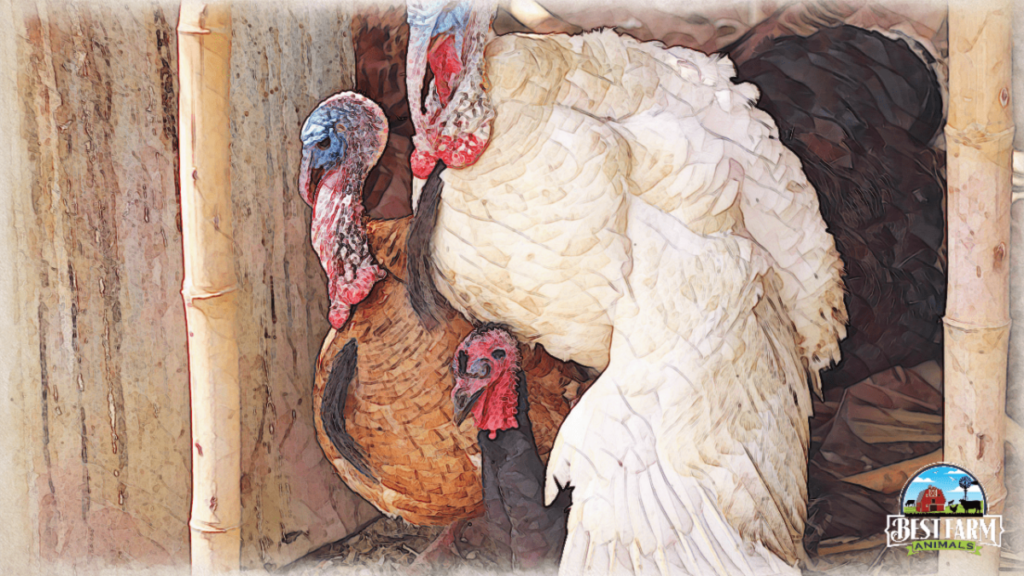
6. Have Your Phone Ready for Crazy Moments
Turkeys are incredibly clumsy. Expect them to run into doors and trip over everything from your slippers to the dustbin. Watching the poults run about is so much fun, and you will soon begin to run out of memory on your phone from all the videos you will be making for TikTok.
In addition to turkeys being fun and entertaining to watch, they are also quite a lot of work. With a pet that’s this demanding of cuddles and attention, you need to weigh up whether you have enough time for a pet turkey or not. When a turkey feels ignored or neglected, it will become destructive and your property may suffer.
7. Clean up Will Be Intense
If you are considering house training your turkey, you need to keep in mind that since turkeys are big, everything about them is big—including their poop. Turkeys in the house mean active potty training.
Fortunately, turkeys are fairly happy to poop in one spot, so you can train your turkey to use a potty pad or sandbox for their business. However, you will need to have oodles of patience. The best is to train the poults, but these large chicks are also notoriously forgetful and often forget where their food bowls are. They will likely forget where the potty place is too.
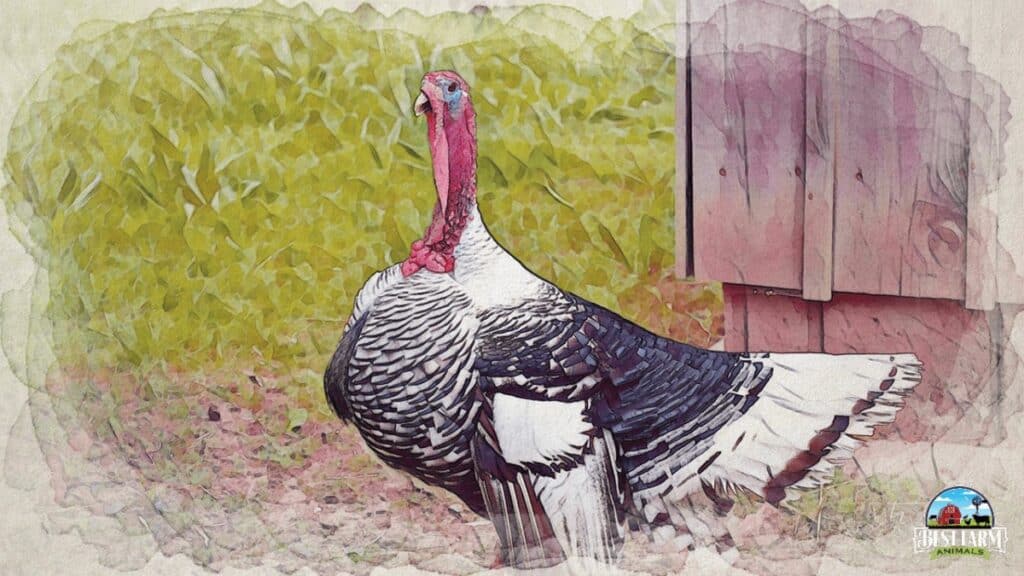
8. Sleep Time Should be Quiet
A turkey requires a lot of sleep. Poults sleep two hours a time, and they repeat this four times during the day. In addition to that, poults sleep another 8-10 hours at night. That’s way more sleep than you ever get.
If you think you can simply place your turkey in their enclosure and forget about them, you’ve got another thing coming. Turkeys, especially the poults, demand your presence when they sleep. They like to feel safe and supported, so they will snuggle up on your lap while you are trying to do taxes at your PC, and they will nest at your feet to feel safe while you are cooking.
Having sleeping turkeys all around you can be a tripping hazard. When turkeys are startled, they will also gobble and cluck wildly. If you have a pet tom turkey, he may even become slightly aggressive if his sleep is disturbed.
9. Say Goodbye to Your Garden
Turkeys may not scratch as chickens do, but they do so much deeper than a chicken ever can when they scratch. When you see the massive claws that an adult turkey has, you will understand.
If left alone in your garden, a turkey can demolish your plants, destroy garden beds, and obliterate any flowers you may have planted. Likewise, if your smallholding has cultivated fields, you may need to ensure your turkeys are kept under lock and key to protect that investment.
Turkeys are also amazing at controlling ticks in your garden.
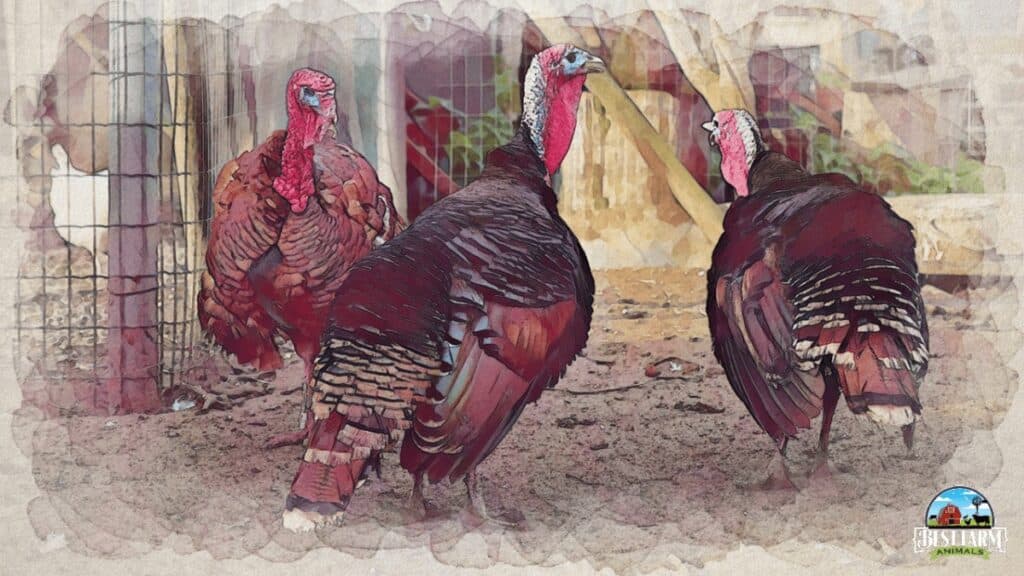
10. You Will Never Be Alone Again
Turkeys are not only giant feathered lap dogs, but they are also stalkers of the highest level. I remember walking along the barn on my property only to hear a sudden gobble behind me that sent me jumping out of my boots in fright.
Why does my turkey follow me around? Your turkey will follow you around because they enjoy your company and are looking for attention or want to socialize. This is your turkey’s way of showing affection; they’ll often lie by your feet when you sit down. Some turkeys will follow you around when they want your approval or if they feel anxious.
Turkeys are quite vocal birds. The tom turkeys are known to gobble with joy each time they see you. They may call incessantly to the female turkeys on your property. The hens cluck softly, but when they are raising the alarm, they can screech loudly too.
What makes the turkey’s sounds so endearing is that they are known to cluck and gobble along to music. But until you reach that level of bonding, their unexpected gobble or cluck can scare the life out of you and many of your other farm animals.
11. Turkey Moods Are Easy to Tell
Turkeys have built-in mood rings. The tom turkey’s moods are especially easy to spot. When he feels upset, his neck and head color change to blue. If he is excited, his head and neck will color red. This is a simple defense mechanism as a turkey’s head is vulnerable during a fight. So the blue color is from blood draining from the capillaries in the turkey’s neck and head skin. If another turkey pecks this area, there will be less blood loss.
The red color of their neck and head is obtained when blood flows into the capillaries of the neck and skin. If your tom turkey’s neck and head turn blue and he spreads his wings while looking at you, it’s time to run. Turkeys aren’t known for being aggressive, but the tom turkey can be territorial.
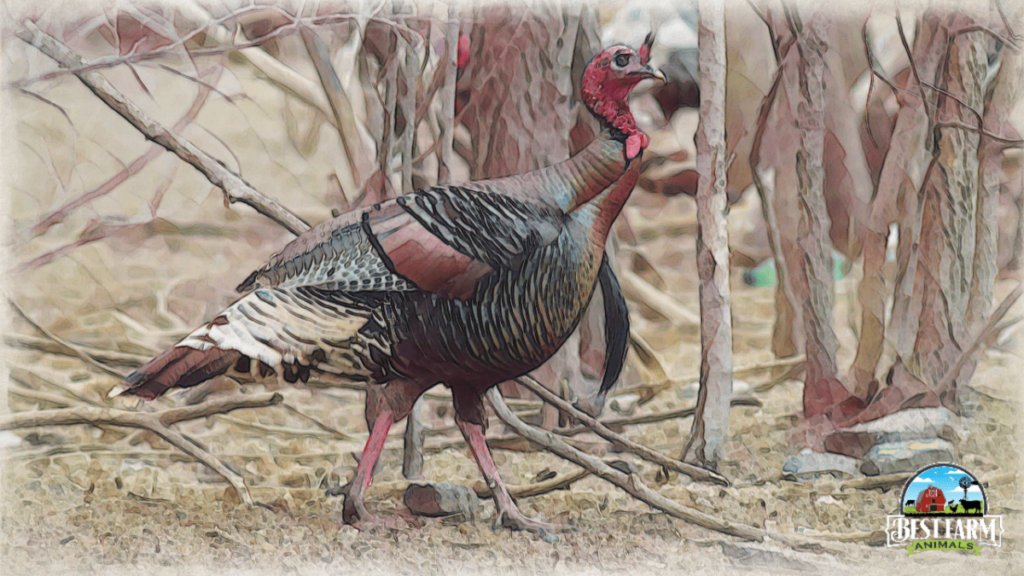
12. Turkeys Are Athletes
Despite a turkey’s heavy size, they are surprisingly agile. Turkeys can fly, they can run fast, and they can leap too. These feathered athletes have developed these skills to survive in the wild. An adult turkey can easily leap up to a low hanging branch to roost for the night as a way to avoid predators.
The homeowner who wants a turkey pet may be required to clip their turkey’s wings. Turkeys can leap while flapping their wings, which is how they can fly up into tree branches. It is also how a turkey can escape your enclosure and make amok with the neighbor’s poultry.
If you live in an isolated area, you may have to clip your turkey’s wings yourself. In fact, you will have to cut their wings every six to eight weeks to prevent your turkey from growing long enough feathers to lift and fly.
13. Hatchlings Are a Handful
At some point, you may want to start breeding your turkey pets. When your turkey hen comes into season, there is a display of magnificent dancing by the tom turkey. It won’t be long (about 28 days for gestation) before your turkey hen begins to lay a clutch of eggs and the incubation starts.
Turkeys lay clutches of 8-16 eggs at a time. These eggs are also much larger than chicken eggs. And if you are wondering: yes, you can eat turkey eggs. When turkeys hatch, the poults are quite clumsy and weak for the first several weeks.
It will be up to you to ensure each poult has eaten enough. A poult is rather strange as it will die of thirst sitting right next to the water bowl. It would help if you showed the poults where everything is. Repeatedly.
14. Watch out for Blackheads
Chickens are a farmyard staple, but when it comes to having turkeys, you need to take extra precautions to prevent the transmission of diseases. Blackhead disease is a terrible sickness caused by contact with the protozoan parasite called Histomonas meleagridis.
When turkeys are infected with this single-cell parasite, they may sicken and die.
A method to treat blackhead disease is to deworm your turkeys regularly.
What are the common diseases of a turkey? Common diseases that affect a turkey are mycoplasmosis, fowl typhoid, fowl pox, fowl cholera, roundworm infections, and blue comb. Other common diseases include arthritis, bird flu, bumblefoot, aspergillosis, and turkey coryza. Free range turkeys are less likely to contract these diseases than those kept cooped up.
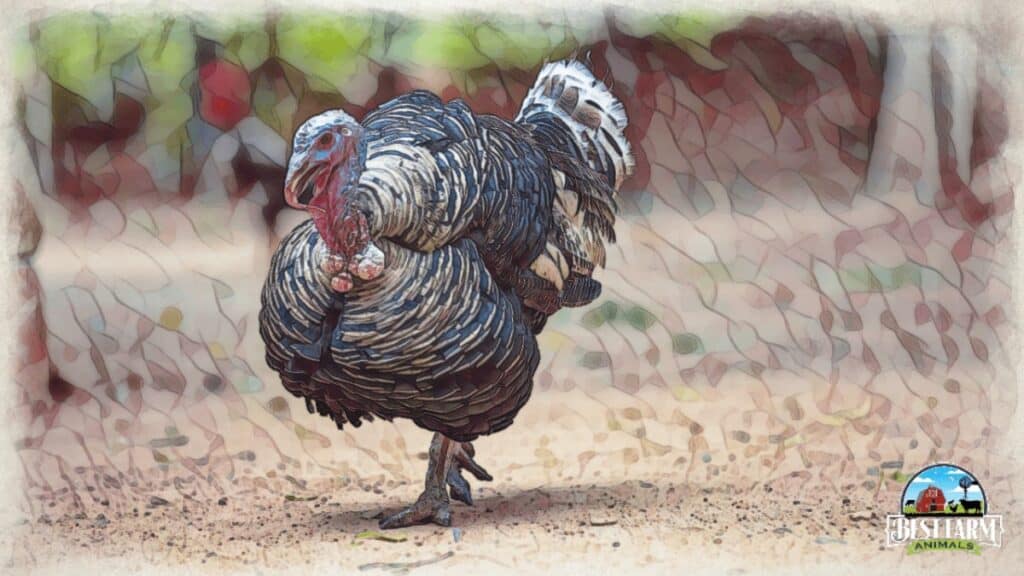
15. You Can Stop Turkey Extinction
Sadly, many heritage breed turkeys are now on protected lists with animal welfare. However, you can choose to take on a pair of heritage breed turkeys. Choose from the bourbon red, black Spanish, royal palm, narragansett, and blue slate heritage turkey breeds.
Do turkeys need to be in pairs? Turkeys can be kept on their own but then need loads of attention. However, as they are social (and flock) animals, they are happier and thrive in pairs or groups to satisfy their need to breed. If no other turkeys are around, they’ll get along with other animals, such as chickens, goats, and sheep.
These turkeys are small enough to reproduce on their own, and you can protect these rare breeds from extinction by fostering breeding pairs. These beautiful turkey heritage breeds are show-worthy, and you can train your turkey for showing too.
Quick Guide To Clipping Turkey Wing Feathers:
1. Identify the Wing Feathers
Turkeys have layers of feathers on their wings. The lowest layer of feathers has the longest feathers and these are called the primary or flight feathers. These are the ones you want to clip.
2. Identify the Secondary Feathers
Above the primary feathers, you will find a row of shorter feathers called the secondary feathers. These are feathers that improve wing strength and keep the turkey’s body warm when they have their wings folded in.
3. Cut the Primary Feathers
Using sharp sterilized scissors, clip the first four primary wing feathers about half an inch below the edge of the secondary feathers. Cut each feather individually to ensure you don’t clip through a blood feather.
If the feather bleeds when you cut, you’ve cut through a blood feather. To stop the bleeding, you can use cornstarch to clot the blood, you can pinch the feather shaft flat, or you can apply pressure.
Your turkey will no longer be able to fly up into the trees or over to the neighbor’s yard.
In some states, it is illegal to own a turkey without clipping their wing feathers. This is to ensure these large birds don’t start to free roam in the suburbs where they can do massive damage.
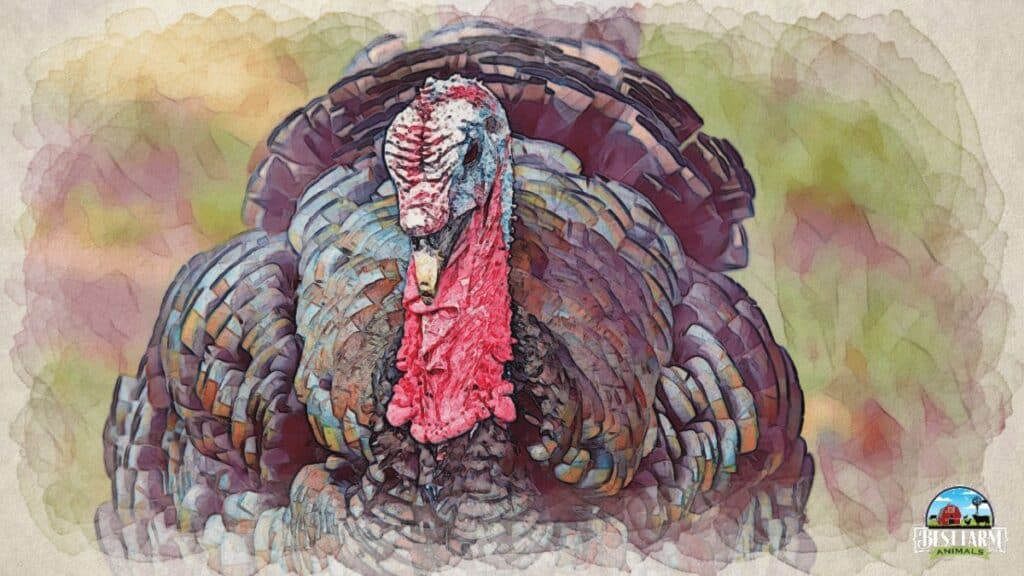
Raising Turkeys FAQs
Are turkeys noisy?
In general, turkeys are pretty quiet birds. Unlike chickens that chatter continuously, a turkey gobbles occasionally, and mostly when calling to other turkeys or signaling a mate. The gobbling sound doesn’t last long and is about as loud as a rooster crowing. The sudden sound may irritate neighbors if you live in an urban area.
How long do turkeys live as pets? (suggested keyword: Pet turkey lifespan)
The pet turkey lifespan is between 3-10 years, depending on their care. If a pet turkey is looked after properly and has a good diet, they can live up to an average of 10 years. In the wild, a turkey typically has a lifespan of 3 to 5 years only. Pet turkeys usually die from illness, injuries, or poor diet.
Can a turkey live with chickens?
A turkey can live harmoniously with chickens, as they are also flock birds. You must keep an eye on the animals as they can sometimes fight (if they become territorial), and disease can be spread among them. If you have a gobbler (male turkey) and roosters and there are other female turkeys, there will be fighting.
What breed of turkey makes the best pet?
One of the best turkey breeds for pets is the Narragansett turkey breed. This breed’s lovely and calm temperament makes them excellent around children. They are lovingly known as the dog-like breed, and they enjoy spending time with their owners. Narragansett turkeys will follow children and cuddle on command.
Can turkeys be tamed?
Depending on the breed and age of the turkey, they can be successfully tamed. You’ll need to spend plenty of time with them and provide them with treats. Wild turkeys are harder to tame and require a lot of patience and consistency. Clipping wings may be required while taming them to prevent them flapping into trees or from your property.
Are pet turkeys smart?
Turkeys are very smart animals. They are naturally curious and playful. They can recognize faces and remember several voice commands (once trained). Turkeys enjoy playing games such as hide and seek and listening to music. Many pet turkey owners hide toys and treats to amuse these intelligent birds.
Will pet turkeys fly away?
A pet turkey isn’t likely to fly away as they have been bred to have large breast muscles, which make them heavier. A pet turkey would only attempt to fly if they’re frightened or feel threatened. Young turkeys that are still lean can flap into trees and over fences, but long distance flight is challenging to them.
Will a turkey peck you?
A turkey might peck you if they feel territorial (or threatened) and try to dominate you. This is common in gobblers (adult male turkeys). A turkey might peck you accidentally when they attempt to take food from your hand. Usually, a tame turkey isn’t prone to aggression and won’t peck as easily as a chicken or rooster may.
Conclusion
Turkeys are fascinating pets, and while they’re not exactly conventional, you can build a friendship that will last over 10 years. Between the cuteness, clumsiness, clucking and gobbling, and crazy flight capabilities, keeping turkeys as pets may be the best move you can make.
Ensure your turkey pet is stimulated, occupied, and potty trained, or you will regret ever buying a poult or a young turkey to begin with.

